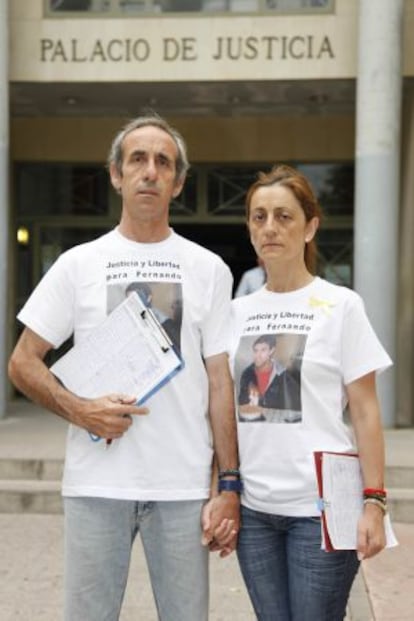Freedom, but not justice
Open regime for man wrongly imprisoned, but court does not grant acquittal Police targeted Muñoz after his cellphone was found among stolen items

Fernando Enrique Muñoz, aged 22, has spent the last two years of his life in prison for a crime that not only he says he didn't commit, but that the governor of the jail himself is convinced he is innocent of. As a result, on December 16 an Alicante court granted him open-regime status, under which prisoners can enjoy privileges such as daytime work release and weekend furloughs, but he was not acquitted.
Muñoz was arrested in 2010 after his cellphone was found among stolen items recovered by police. The police and several of the victims of the robberies identified him as one of a gang of thieves, and he was sentenced to 10 years in prison, despite insisting that he had lost his phone. In June of this year, four long years after the robberies he was sentenced for participating in were committed, he finally received proof from his phone company, Orange, that he had reported the loss of the phone the day before the crimes he was charged with were committed. But the Supreme Court ruled that this was not sufficient proof to revoke his sentence.
The ruling by the Alicante Provincial Court that has now granted him open-regime status was largely based on the testimony given by Feliciano Crelgo, the governor of the prison where Muñoz was incarcerated. Crelgo, who has worked in the prison system for more than three decades, said in his testimony that Muñoz's "personal profile does not fit that of the type of offender responsible for the crimes in question, nor does he seem to have any relationship with the perpetrators of the crime." This testimony, along with the fact that Muñoz had paid 18,000 euros in compensation to the victims, as well as "strong support from his family" and a job offer, were all taken into account by the court in reaching its decision.
After meeting with Muñoz shortly after he entered prison, Crelgo decided to look into the circumstances of his arrest, suspecting that Muñoz may have been wrongly imprisoned. He spoke to Israel Torres, who was sentenced alongside Muñoz, who confirmed that the latter had no involvement in the crime and that another man also sent down for his alleged participation, Juan de Dios Díaz Moreno, also had nothing to do with the robberies.
The judge overseeing the hearing said that he had never come across such a case: "In my 33 years working in this profession, this is the first time that I really believe that a prisoner did not commit the crimes for which he has been sentenced."
Muñoz had reported the loss of his phone the day before the crimes in question
Another inmate in the same jail as Muñoz, but who was not involved in the robberies, wrote a letter to the court. "Juan de Dios Díaz Moreno and Fernando Muñoz were unjustly sentenced [...] because the witness made a mistake in the identity lineup." The prisoner then confessed that he had committed the crime along with Israel Torres and another man, José Manuel Cortés, who agreed to appear in court to testify that the two men had nothing to do with the crime.
Muñoz says that on the evening before the robberies were committed, February 19, 2009, he called Orange to report the loss of his phone and to have it blocked. The telephone had gone missing the night before, during a birthday celebration. Two days later, on February 21, police in the town of Elda, in Alicante province, returned the phone to his father. It had been found among stolen items left in a vehicle used by the thieves. Their modus operandi was to cause a traffic accident and then rob their victims when they got out to inspect the damage. Subsequently, the police decided that Muñoz might be involved, and brought him in for questioning, as well as including him in an identity lineup.
Following the court's ruling, Muñoz was transferred from Villena prison to a low-security unit. He will now be given weekend release, and once he has returned to work, will no longer have to spend time in prison, instead wearing an electronic tag.
Santiago Talavera, Muñoz's lawyer, said that he was pleased with the court's ruling. "This is an important victory, but only a partial one, because we have not managed to get his sentence overturned. However, the most important thing was to get the kid out of jail," he said. "However you look at this, we have managed to end an injustice, even if it leaves a bad taste in the mouth that he has not been acquitted. But now that he is out, we will have the time and the opportunity to make that happen," he said.
Tu suscripción se está usando en otro dispositivo
¿Quieres añadir otro usuario a tu suscripción?
Si continúas leyendo en este dispositivo, no se podrá leer en el otro.
FlechaTu suscripción se está usando en otro dispositivo y solo puedes acceder a EL PAÍS desde un dispositivo a la vez.
Si quieres compartir tu cuenta, cambia tu suscripción a la modalidad Premium, así podrás añadir otro usuario. Cada uno accederá con su propia cuenta de email, lo que os permitirá personalizar vuestra experiencia en EL PAÍS.
¿Tienes una suscripción de empresa? Accede aquí para contratar más cuentas.
En el caso de no saber quién está usando tu cuenta, te recomendamos cambiar tu contraseña aquí.
Si decides continuar compartiendo tu cuenta, este mensaje se mostrará en tu dispositivo y en el de la otra persona que está usando tu cuenta de forma indefinida, afectando a tu experiencia de lectura. Puedes consultar aquí los términos y condiciones de la suscripción digital.








































